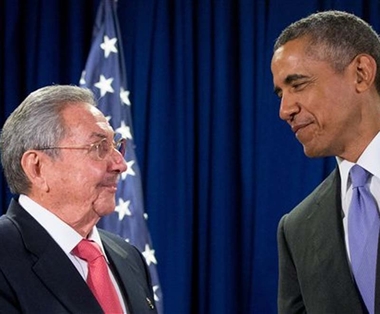Obama to chop down more Cuba barriers, but is Havana ready?

Washington (AP) — On his history-making trip to Cuba, President Barack Obama plans to chop down another set of barriers that for generations kept Americans and their money out of the island they once dominated. Getting Cuba to reopen to America is proving harder.
Hungry for dollars but wary of U.S. influence, Cuban President Raul Castro's government has taken only a few cautious steps to allow U.S. commerce and tourism to return. Even as Obama's administration prepares to let more Americans travel and businesses operate in ways unimaginable just two years ago, it's unclear how far Cuba's labyrinthine bureaucracy and socialist ideals will bend.
It's a critique of Obama's peace-making with Cuba that has gained fresh relevance ahead of his trip, which opponents say rewards a government unwilling to significantly open its economy, let alone abandon single-party government. When it comes to human rights and democracy, Republican presidential candidate Marco Rubio says that since relations were restored, "things are worse."
None of that is stopping Obama from using his trip starting next weekend — the first such visit in nearly 90 years — to try to push the diplomatic relaunch past the point of no return before he leaves office. In a bid to show growing momentum, his administration is preparing to further ease restrictions and green-light projects by U.S. companies in connection with the trip, according to a half-dozen individuals familiar with the administration's plans.
Starwood, the hotel chain whose brands include Sheraton and Westin, is expected to get formal U.S. approval in the coming days, following extensive conversations with Cuban and U.S. officials. The company has applied for a license from Treasury Department's Office of Foreign Assets Control, which would allow it to operate in Cuba despite congressional sanctions.
The Connecticut-based chain has explored numerous possibilities that include the famed Hotel Saratoga in central Havana, said the individuals, who weren't authorized to discuss the plans and requested anonymity. Yet Cuba's resistance to letting foreign companies build or own property makes it more likely Starwood would manage existing hotels, not build them.
Another hurdle: Foreign business can't hire workers directly. Employees work for a Cuban hiring agency that keeps much of their salaries, one factor blamed for Cuban hotels' infamously sub-standard food and service. The U.S. hasn't yet managed to get Cuba to announce it will ease that policy.
For Cuba, any American footprint carries uncomfortable echoes of the decades before its 1959 revolution, when American business and organized crime worked hand-in-hand with U.S.-backed strongmen to dominate the island's economy and politics, often with brutal force. For old-school Cuban officials, U.S. hotels, flights and cruise ships are not just new business, but a direct ideological challenge to a system that sees resistance to U.S. dominance in the region as part of its national mission.
"In Congress, there's a lot of criticism from my Republican colleagues about getting this or that before going down there," said Rep. Peter Welch, D-Vt., one of dozens of lawmakers joining Obama's trip. "But the big decision is, do you want to be engaged or not?"
A Marriott spokesman said that chain was also hoping for approval soon, and its CEO, Arne Sorenson, was traveling in Obama's delegation. Carnival Cruise Line, which already has U.S. approval, said it expects Cuban approval soon after months after waiting and plans to sail starting May 1.
The Obama administration is also poised to remove another roadblock for travelers, allowing Americans to travel independently for educational purposes rather than in organized, group trips. Cuba travel experts say U.S. travel to Cuba could rise another 20 percent this year with that change.
The White House declined to comment on any potential announcements related to Cuba policy or Obama's trip.
Obama also has another goal: making it near-impossible for a future president to halt or reverse the new engagement that Obama and Castro announced in 2014 after secret talks. Ben Rhodes, Obama's deputy national security adviser, said Americans' eagerness to experience Cuba will make it politically untenable to pull the plug.
"I don't think we're there yet," Rhodes said in an interview. "But if we can use the remaining time to create opportunities for U.S. businesses to operate in Cuba, with direct flights and more Americans traveling, and to demonstrate this is improving the lives of ordinary Cubans, all those factors will make this irreversible."
Obama is expected to come with a series of announcements from U.S. companies that plan to launch operations in Cuba, particularly related to Internet and telecommunications, people familiar with the planning said. His visit also comes as the Transportation Department prepares to award the first routes to Cuba for U.S. airlines, likely within months.
Aiming to show the trip didn't signal American acquiescence on human rights, the White House stressed that Obama plans to meet with Cuban dissidents that he — not Castro — will pick. He'll also meet Castro, attend a Major League Baseball exhibition game and deliver a major speech.
By Josh Lederman and Michael Weissenstein, Associated Press. Copyright 2016 The Associated Press. All rights reserved. This material may not be published, broadcast, rewritten or redistributed.
The Gayly – March 12, 2016 @ 10:25 a.m.





